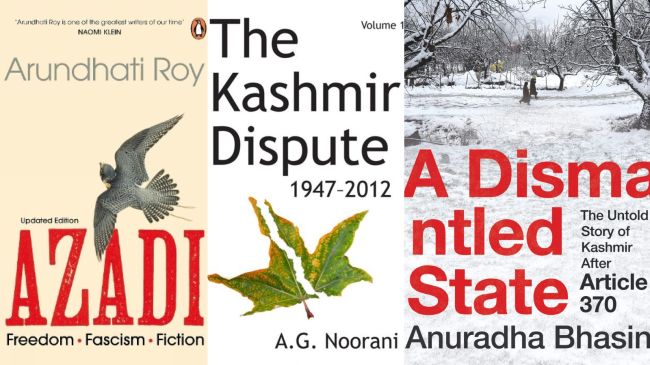Opinion Book ban in Kashmir reveals an insecure establishment
The banned books engage with the region's complicated, and often tragic, history of conflict. That history cannot be wished away
 The banned books engage with the region’s complicated, and often tragic, history of conflict. (Source: Amazon)
The banned books engage with the region’s complicated, and often tragic, history of conflict. (Source: Amazon) Less than five months after Union Home Minister Amit Shah posted on X that “under the Modi government, separatism is breathing its last, and the triumph of unity is echoing across Kashmir”, the Union Territory’s Home Department has issued a notification, by order of Lieutenant Governor Manoj Sinha, banning 25 books. It claims that they propagate a “false narrative and secessionism in Jammu and Kashmir”. And a day later, the police launched a drive across Kashmir to seize copies of the banned books. These include the works of A G Noorani, Arundhati Roy, Victoria Schofield and Ather Zia. What changed between March and August that an establishment which was congratulating itself for the progress made in Kashmir should display such heightened insecurity five months later that it should seek to banish books? Even in the aftermath of the Pahalgam attack — for which the Centre has held Pakistan responsible — the message of unity was underlined and emphasised by the politicians and people of the Valley. They stood with the rest of the country in a difficult moment, and shared the grief of the families who lost their loved ones in the terror strike. Kashmir has come far since the abrogation of Article 370 six years ago, and it now also has an elected government in place. That the Centre and its appointee, the L-G, still believe that banning books and curbing freedoms is an effective strategy against alienation and disaffection in the Valley, belies their claims of the distance covered. The ban on books is both disturbing and disheartening.
The banned books engage with the region’s complicated, and often tragic, history of conflict. That history cannot be wished away. Indeed, for peace to endure, it must be engaged with, and different perspectives must converse and even collide in an open space. Across the world, in societies moving towards a resolution of tangled histories, repressive acts like book bans have rarely contributed to lasting accommodation, or assimilation. By all accounts, the most effective tool to bring stability and combat disenchantment remains a deepening of democracy and institutionalisation of people’s participation in decision-making. The only way to combat a “narrative” the government disagrees with is to build its own in a manner that is inclusive and persuasive. Since the abrogation of Article 370, the Union government has highlighted the region’s economic development, underlining that Kashmiris have a stake in the larger India growth story. That promise must be bolstered by a renewed commitment to strengthening federal democracy and guaranteeing individual freedoms in the Valley.
Now that the UT of J&K has a chief minister and legislature, it is looking ahead to the return of statehood, a promise made by the Centre. Wednesday’s draconian order, however, takes several steps backward. The J&K administration also seems to have forgotten the most basic principle of freedom of expression, articulated by then Chief Justice of the Madras High Court, S K Kaul, while quashing the criminal case against writer Perumal Murugan: “There is no compulsion to read a book. Literary tastes may vary — what is right and acceptable to one may not be so to others. Yet, the right to write is unhindered.” So, too, is the right to read.






